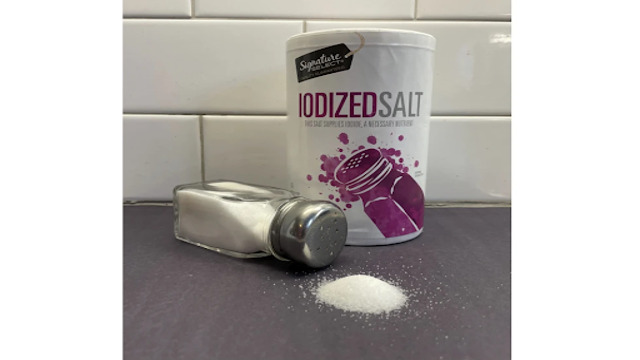
Iodized salt is on display. Image: AP Photo
Iodine deficiency, once a major health issue in the United States, is beginning to resurface, raising alarm among medical professionals. It was almost eradicated during the 20th century thanks to the widespread use of iodized salt. However, with changes in diet and food production, experts are now seeing cases of iodine deficiency in certain groups, especially children and pregnant women.
In 2021, a 13-year-old boy visited a clinic with a rapidly swelling neck, a condition doctors couldn’t initially explain. After further testing, they discovered that the cause was iodine deficiency. This case, though rare, highlighted a growing concern about the nutrient's decline in modern diets. A century ago, iodine deficiency was widespread across large parts of the country. Back then, it caused severe health issues in children, including stunted growth, deafness, and intellectual disabilities, a condition known as cretinism.
The health crisis was largely addressed in the 1920s when iodine was added to salt. By the 1950s, over 70% of U.S. households used iodized salt, and iodine deficiency became a problem of the past. Additionally, iodine was added to other foods, including bread, ensuring that most people received enough of it.
However, dietary habits have changed dramatically over the years. The consumption of processed foods, which are often high in salt but low in iodine, has increased significantly. As a result, many people no longer get sufficient iodine. Popular salts like kosher salt and Himalayan rock salt are non-iodized, and many leading bread brands no longer add iodine. For children, the issue is compounded by restrictive diets, like the case of the 13-year-old boy who was a fussy eater, consuming only specific types of bread and peanut butter.
Dr. Elizabeth Pearce, an expert on iodine deficiency at Boston Medical Center, noted a 50% drop in iodine levels among Americans between the 1970s and 1990s. While most people still get enough iodine, women and children are particularly vulnerable. Iodine is crucial for healthy brain development in children, and its deficiency can lead to cognitive issues. Recent studies have linked iodine deficiency in pregnant women to lower IQs and language delays in their children, though there is ongoing debate about the exact levels that cause problems.
Pregnant women are recommended to consume 150 micrograms of iodine daily, which can be easily achieved through iodized salt. However, some prenatal vitamins don’t contain iodine, which is why doctors advise women to check their supplement labels carefully. Research indicates that up to 25% of pregnant women in some areas are not getting enough iodine. Dr. Monica Serrano-Gonzalez, who treated the 13-year-old boy, stated that she and her colleagues have seen multiple cases of iodine deficiency in children at their clinic. She expressed concern that this issue may be on the rise, particularly in children with restrictive diets.
Although iodine deficiency is not yet widespread, experts urge that it be placed back on public health radars. With continued attention and proper dietary adjustments, iodine deficiency can once again be addressed effectively, preventing further cases and protecting vulnerable groups, especially pregnant women and children.















